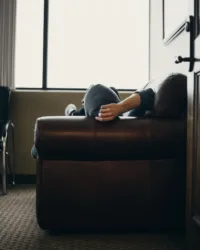
Overcoming substance use requires making a major change to your life. When you decide to seek treatment for addiction or substance use disorder, your counselor will likely assess this readiness for change. In other words, they’ll take the time to learn at which stage of change you find yourself.
This then helps them build out a treatment program that, based on your needs, will be most helpful for you in achieving and maintaining sobriety.
What are stages of change?
While these stages are outlined sequentially, everyone’s experience with addiction is different. What this means is your journey through the stages of change might look completely different from another clients’s experience. Some people spend a long time in each stage, some skip over stages and others may revisit a previous stage more than once.
There is no such thing as a right or wrong way to journey through the stages of change in addiction recovery. For this reason, you and your counselor will work closely together to create a recovery treatment plan suited to your goals.
Precontemplation stage
In the precontemplation stage of change, you are not even aware that there is a problematic behavior needing to be addressed. It’s likely that a client in this stage of change denies that the substance use is, in fact, a problem, and, if they do contact a counselor, it’s the result of pressure from a peer, spouse or family member.
Many people at this stage underestimate or doubt the positive effect change could have in their life. They often say that they do not intend to act anytime soon.
At this stage, they may be reluctant to lifestyle change due to lack of knowledge or a rebellious attitude. They may even feel complete hopelessness or doubt change is even possible at their level of addiction.
On the other hand, they might not believe their addiction to be a problem, and therefore don’t see the necessity of treatment at all. At this stage of change, it’s important for counselors to debunk both myths: firstly that no one’s case is ever hopeless, and secondly that counseling can be an important part in opening oneself up to the desire to change.
Contemplation stage
When you realize the need to make a change, you enter the contemplation stage. This realization or openness can come from yourself or through conversation with another. In the contemplation stage, you begin to weigh the pros and cons of making a change, but do not take any action steps towards forming a recovery plan.
Many clients can be on the fence during this time and seek general information rather than direct, personalized help. Counselors can help ease clients into openness towards the benefits of treatment and ensure that no matter what their past experiences may be, recovery is possible when they are ready to seek it.
Preparation stage
Once you commit to making a change and begin to develop a plan to foster this change, you have entered the preparation stage.
A client in the preparation stage has accepted the need for change and has begun to take steps to support this change. This might include planning the kind of change and how it’s to be done (like planning on quitting substance use completely by entering a detox program); gathering a support system; and eliminating any potential triggers from the surrounding environment.
Action stage
When the plan is implemented, you enter the action stage of change.
This might be attending detox; it might be entering an addiction treatment center. While it is the most tangible part of turning one’s life around, it can also be one of the most challenging, physically and mentally. However, no matter what your action stage looks like, if it follows the steps set out by yourself and your counselor, you will find yourself headed toward achievable and sustainable recovery.
Maintenance Stage
The maintenance stage begins when you have sustained the changed behavior for a measurable period of time. In the case of overcoming an addiction, this would mean long term abstinence from drugs or alcohol. In order to maintain sobriety, your counselor will work with you to create healthy coping mechanisms, deal with triggers when they arise and help you find long term support in the guise of support groups post treatment.
Changing your life
Making a change may seem daunting, especially when it involves your substance use. But no matter where you find yourself, even if you’re in the precontemplation stage for the second time in your life, recovery is possible.
The counselors at Rehab After Work understand the various stages of change and are ready to help no matter where you find yourself. Give us a call today at 610-644-6464 to gain more information or discuss specific treatment options for you.






